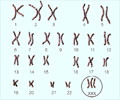X chromosome-linked enzyme ubiquitin-specific peptidase 11 (USP11) explains women's increased incidence of Alzheimer's disease.

Sex-based Differences in Alzheimer’s Disease Explored
Women are afflicted by Alzheimer’s disease roughly twice as frequently as men. The mechanistic basis for this increased vulnerability has not been clear. One potential explanation is that women exhibit significantly higher tau deposition in the brain. The process of eliminating excess tau begins with the addition of a chemical tag called ubiquitin to the tau protein. Because dysfunction of this process can lead to abnormal accumulation of tau, Kang and co-senior study author Jung-A Woo of Case Western Reserve University looked for increased activity of the enzymatic systems that either add or remove the ubiquitin tag.They found that both female mice and humans naturally express higher levels of USP11 in the brain than males, and also that USP11 levels correlate strongly with brain tau pathology in females but not in males. Moreover, when they genetically eliminated USP11 in a mouse model of brain tau pathology, females were preferentially protected from tau pathology and cognitive impairment. Males were also protected against tau pathology in the brain, but not nearly to the extent as in females.
Why Does Alzheimer’s Disease Affect More Women Than Men?
The results suggest that excessive activity of the USP11 enzyme in females drives their increased susceptibility to tau pathology in Alzheimer’s disease. But the authors caution that mouse models of tauopathy may not fully capture the sexual dimorphism in tau pathology seen in humans. “In terms of implications, the good news is that USP11 is an enzyme, and enzymes can traditionally be inhibited pharmacologically,” Kang says. “Our hope is to develop a medicine that works in this way, in order to protect women from the higher risk of developing Alzheimer’s disease.”Source-Eurekalert













